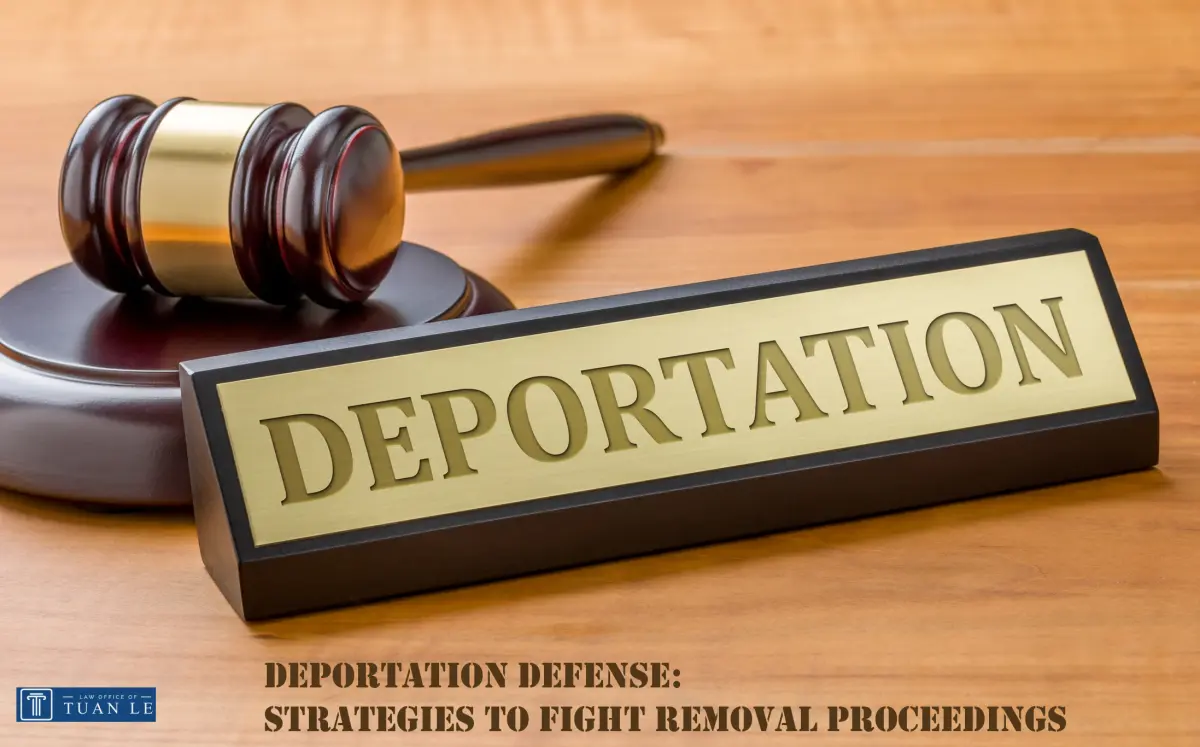Deportation Defense
Full Representation in Immigration Matters for Individuals
November 18, 2025
28 min read
Discover key deportation defense tactics and legal guidance to secure your future with Tuan Le Law Office in Orange, CA.

Deportation defense is a vital component of immigration law. It is designed to assist immigrants who are at risk of being deported from the United States. Indeed, strategies at the heart of this defense require presenting cases before an immigration judge, thereby underscoring the complex nature of deportation law. Regrettably, the cost of legal representation - which can significantly sway the outcome of cases - is frequently unaffordable for numerous immigrants. Consequently, this situation underscores the necessity of adopting an informed strategy to combat removal proceedings. Such proceedings carry significant consequences for the lives of the people involved. This article acts as a comprehensive guide to deportation defense. It merges legal expertise with personalized advocacy to protect the rights of individuals undergoing removal in the U.S. It underscores the significance of tailored case assessments, strategic legal advocacy, and the pivotal role of skilled immigration lawyers, like those at Tuan Le Law Office in Orange, CA, who are dedicated to securing favorable outcomes through a variety of relief options. The article is a valuable resource for individuals and legal professionals alike, emphasizing due process and the vigorous protection of non-citizen rights. Take the first step towards building a strong defense and securing your future in the United States with Tuan Le, in Orange, CA. Call now to schedule a consultation and explore your options.
Deportation defense strategies are critical for safeguarding the rights of individuals against the threat of removal from the United States. These strategies involve a sophisticated array of legal defenses against removal, tailored to counteract or alleviate the impact of deportation actions. Here is a refined overview of these strategies:
Conducting a detailed evaluation of each case to inform defense strategies based on the specific nuances of the individuals situation.
To enhance the chances of a favorable result, it is essential to secure competent legal representation. Skilled immigration attorneys play a pivotal role; they can advocate effectively, particularly for individuals confronting the challenges of deportation.
Utilizing a range of relief measures, such as asylum, cancellation of removal, or adjustment of status, each contingent upon meeting certain legal criteria.
Employing legal arguments and maneuvers to dispute the basis of the deportation, often initiated by a Notice to Appear (NTA) from ICE, and presenting a strong case in front of an immigration judge to postpone or prevent removal.
Mastering the key phrases and definitions in deportation defense is vital for effective deportation defense techniques and fighting removal in immigration court. Here is an enhanced explanation of these terms:
This term refers to the formal process of expelling a foreign national from the United States for immigration law violations.
These are the legal processes initiated by the government to deport a non-citizen, which includes hearings before an immigration judge and may involve a variety of defenses and appeals.
Actions such as overstaying a visa, breaching nonimmigrant visa conditions, or failing to maintain valid immigrant status can initiate removal proceedings.
Certain criminal offenses, like drug-related crimes, firearms infractions, and crimes involving moral turpitude, may lead to deportation proceedings.
Providing false information, hiding facts, or using fraudulent documents in immigration procedures can result in deportation.
Associations with or participation in activities considered dangerous or subversive can lead to removal from the United States.
This legal option is available to some permanent residents and undocumented immigrants who meet criteria such as prolonged residence in the U.S., good moral character, and having close relatives who would face extreme hardship if deportation occurs.
Non-citizens facing the prospect of deportation are entitled to a suite of rights and defenses, underscored by constitutional safeguards. These provisions form the bedrock of immigration court defense strategies and represent proven methods to fight removal proceedings:
Immigrants may hire private attorneys for representation in deportation proceedings, though there is no entitlement to government-funded counsel.
The Fifth Amendment ensures fair legal procedures and the right to a hearing before an immigration judge.
The Fourth Amendment guards against the use of unlawfully obtained evidence in removal proceedings.
Under the Fifth Amendment, immigrants cannot be forced to testify against themselves.
Various defenses are available, such as asylum, cancellation of removal, adjustment of status, and waivers for certain inadmissibility grounds.
Non-citizens enjoy many of the same protections as citizens, including freedom of speech and religion, and equal treatment under the law. Attorneys proficiency in handling the complexities of immigration law plays a critical role. Consequently, their skill in crafting robust defenses often becomes the pivotal element that influences the results of removal proceedings. The push for universal legal representation highlights the importance of due process and equitable treatment, empowering immigrants to assert their rights fully. Don't let the threat of deportation determine your future. The right legal representation is your strongest ally in the fight to remain in the United States. If you or a loved one are facing removal proceedings, act now to secure the expertise of a dedicated immigration attorney. Call now
The reasons for deportation are diverse, including criminal convictions, illegal presence in the country, and fraudulent activities. These reasons are outlined in the U.S. Immigration and Nationality Act (INA) can impact both individuals without documentation and those with lawful permanent residency. Specific criminal convictions that may trigger deportation proceedings include serious crimes like aggravated felonies, drug-related offenses, crimes that involve moral questions, such as theft or fraud, violations related to firearms, and offenses related to domestic violence.
To combat deportation due to visa violations and overstays, individuals have several options. It's crucial to understand that overstaying a visa or violating Its terms puts one at risk of deportation, but there are legal avenues to challenge this. Here is a concise overview:
Consulting with an experienced immigration attorney is a vital first step. An attorney can guide the specific options available based on individual circumstances.
If you receive an NTA, it means you're required to appear in immigration court. The NTA will outline the reasons for potential deportation.
During the court proceedings, the judge will confirm that you understand the charges against you. You have the right to contest these charges.
There are various forms of relief you may seek, such as asylum, adjustment of status, or cancellation of removal, depending on your situation.
It's important to prepare for your immigration court hearing by gathering evidence, such as proof of ties to the U.S., which may support your case to stay.
In some cases, adjusting your status through family relationships (like marriage to a U.S. citizen) can be a pathway to resolving visa overstay issues.
Building a strong defense strategy against removal proceedings begins with a thorough analysis of the Notice to Appear ( NTA). The NTA is a crucial document in the deportation process as it outlines the governments case against the individual, known as the respondent. Here is a precise breakdown of what an NTA includes and how it can be analyzed for defense:
The NTA lists the specific charges and factual allegations that the Department of Homeland Security (DHS) is bringing against the respondent. These charges determine the grounds for removability.
The NTA must meet certain statutory and regulatory requirements, including the respondents identifying information, the nature of the proceedings, and the legal basis for the charges.
The NTA informs the respondent of their rights, such as the right to an attorney and the right to examine the evidence against them, as well as their responsibilities, like the obligation to appear in court.
It's important to verify that the NTA was properly served to the respondent and correctly filed with the immigration court, as any procedural errors can be grounds for dismissal.
The NTA should specify the time and place of the removal proceedings. A defective NTA, such as one lacking this information, can be challenged.
Upon receiving an NTA, respondents should consider legal strategies like filing motions to terminate proceedings based on legal, factual, or procedural challenges to the NTA.
An immigration attorney can help analyze the NTA and develop a defense strategy, including identifying any defects or avenues for challenging the removal.
When confronting the prospect of deportation, it is crucial to amass compelling evidence and secure support from witnesses to construct a robust defense. Initially, you will need to gather vital documents, such as birth certificates and financial records, which serve to establish your identity and demonstrate your integration into the community. Additionally, it is beneficial to have individuals who are closely acquainted with you, such as family members or employers, prepared to vouch for you. On occasion, the insights of an expert may be necessary to elucidate aspects of your home country or to articulate the potential impact of deportation on your family. This information plays a pivotal role in constructing a compelling case against deportation, potentially through seeking asylum or other forms of legal safeguard. The objective is to approach your court date meticulously, ensuring that all evidence is methodically arranged and witnesses are primed to testify. Such thoroughness enables you to present the most persuasive case for remaining in the country. Indeed, the more effectively you can present and narrate your story, the greater the likelihood of a favorable outcome.
In deportation cases, individuals have a few key options for legal relief. These are as follows:
Prosecutorial discretion can halt or delay deportation, with options like not pursuing charges, closing cases, waiving appeals or granting a stay of removal. Legal advice is essential.
Yes, you can appeal a deportation order to the Board of Immigration Appeals (BIA) within 30 days of the decision.
The Supreme Courts decisions can set precedents that affect immigration law and individual deportation cases nationwide.
Planning for long-term immigration goals involves understanding the implications of your current immigration status and taking steps to secure your future in the U.S. This may include applying for different visas, seeking an adjustment of status, or exploring pathways to citizenship. It's crucial to align your immediate actions with your long-term aspirations to ensure a stable immigration journey.

Navigating the complexities of immigration law, especially in removal proceedings, requires the expertise of a dedicated immigration lawyer. These professionals are not just legal advisors but also advocates who stand by their clients in court, offering strategies to fight deportation. They analyze each case, challenge procedural errors, and use every humanitarian angle to build a strong defense. Their advocacy extends to appeals, fighting tirelessly for the rights of immigrants. For those in need of such legal assistance, Tuan Le Law Office stands ready to offer Its services. With a deep understanding of immigration law and a commitment to their clients, they are well-equipped to help. Reach out to Tuan Le Law Office for a consultation and take the first step towards a strong defense.
Need guidance from an experienced immigration attorney?
Mr. Le has granted you a 30-minute consultation session.